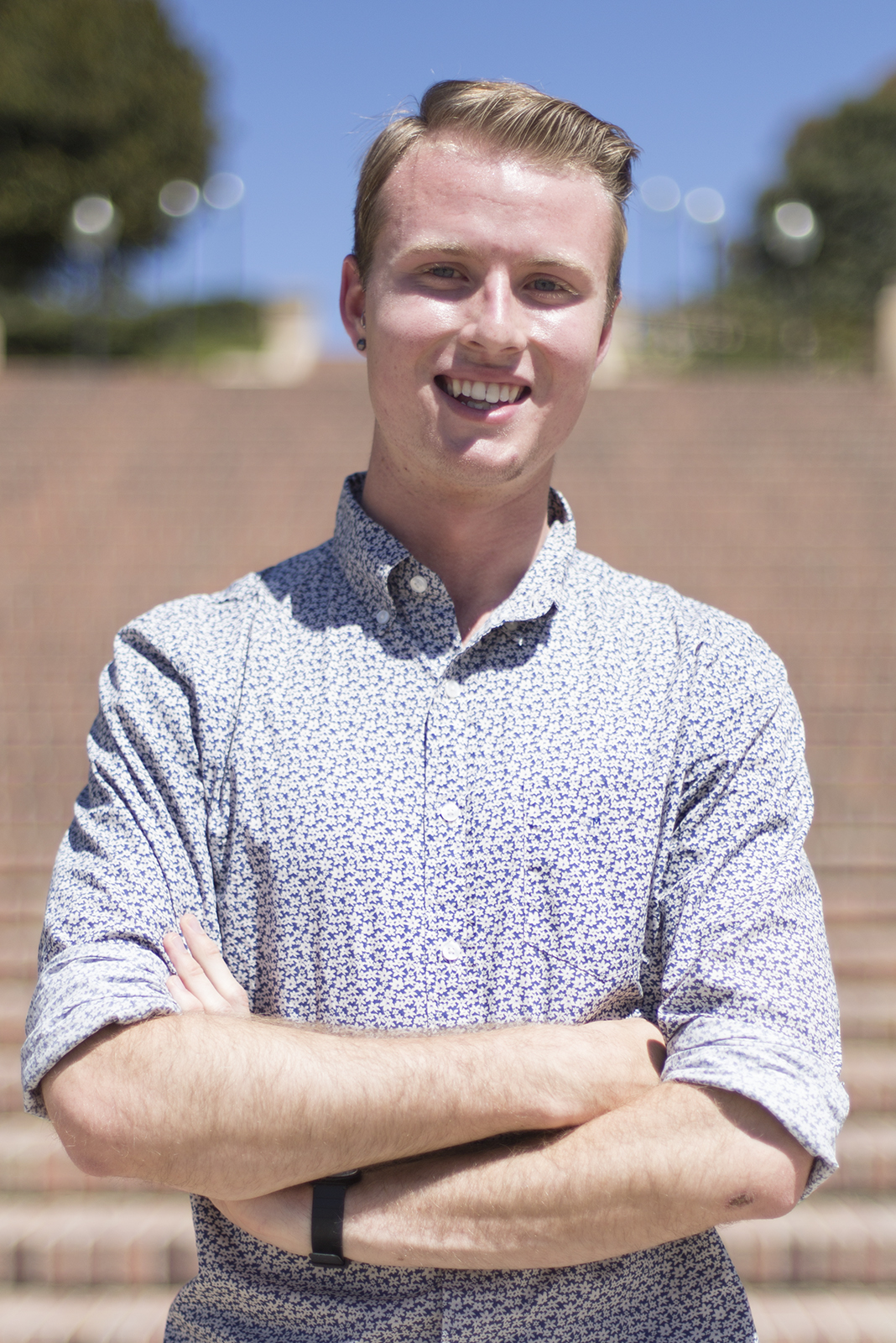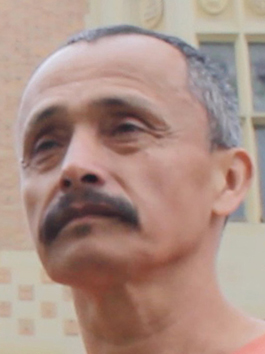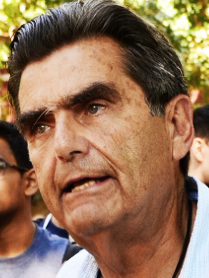Preachers on Bruin Walk take different approaches in spreading gospel
The fight on Bruin Walk is against no less than eternal damnation. This is how the many loosely connected contingents of preachers who make the journey to the UCLA campus say they feel when they come out to preach.
For Isidro Mendoza, the fight began in 1997 when he lost a brother, who was in his mid-30s, to a car accident.
“I wanted to die. I felt like someone had reached into my stomach and ripped my guts out,” he said.
Despite never having read the Bible before, he said reading a copy of the New Testament after his brother’s death was the only thing that comforted him in his grief.
Reading the book initiated a born-again experience, he said. And since then, he has preached the word of the gospel.
Armed with a 6-foot-tall paper-mâché replica of the Bible and an orange prison jumpsuit he wears to symbolize what he calls humanity’s criminal nature, Mendoza said he tries to make it to UCLA once a month to attempt to save the souls of its student population.
“This world is contaminated by sin and I have the medicine for it, which is the word of God,” he said. “I would be the most wicked person on Earth if I was to hide it.”

Lucas Macias, an open-air preacher, spoke about the gospel in Long Beach at the Toyota Grand Prix. He said he started coming to UCLA to preach at the end of last year. (Owen Emerson/Daily Bruin)
Many preachers who come to Bruin Walk share Mendoza’s mission to save the souls of passersby and are often met with a negative response.
Tony Miano, a member of Grace Community Church who comes to UCLA to preach, said colleges campuses are an ideal place for preachers to do this work. He said on any given day they can potentially reach tens of thousands of young people.
In addition to college campuses, Miano said preachers coordinate to speak at venues such as sporting events like Lakers games and large-scale award ceremonies like the Academy Awards. The preachers do not belong to an organized group or go to the same church, and some travel from across the world to preach with one another on campus. They meet through a number of methods, including social media and religious conventions.
Those preachers practice a style Miano termed "open-air preaching," or heralding a religious message to a public audience instead of in a church.
A number of UCLA students describe this style as disruptive but entertaining.
“It’s a good study break to listen to them, but it also really disrespectful,” said first-year biology student Matt Camacho, who identifies as Catholic. “On this campus we preach versatility. We accept everybody. (The preachers disrespect) those that are not the same or aren’t part of the norm.”
Engaging the congregation
It is not unusual for students to come up and argue with the preachers or read from alternative texts. Others will parody the diction of the preachers to humor friends and fellow students on Bruin Walk.
Even professors engage with the preachers. In an incident from 2011 immortalized on YouTube, Professor Eric Scerri of the chemistry and biochemistry department verbally sparred with a preacher on Bruin Walk after the preacher told him he denied logic if he did not believe in God. In response, he cursed the preacher and walked away with the preacher’s briefcase.
Many students said they think the preachers disseminate an openly racist, sexist and homophobic agenda.
Mark Drake, a fourth-year mathematics student who is a part of a queer Christian fellowship on campus and identifies as non-binary, said they have observed non-UCLA-affiliated preachers call students “sluts” and carry signs singling out queer students’ lifestyles as sinful.
“I am offended the school is letting this happen,” Drake said. “I really don’t see any excuse for letting random, unpaying, unfriendly proselytizers onto the campus.”
Ricardo Vazquez, a UCLA spokesman, said preachers have been coming to Bruin Walk for many decades. Though the administration condemns any form of intolerance, the campus is a public space and free speech is allowed to take place as long as it does not interfere with programs or classes, he said. He added the university would take action if anyone violates university policy, such as the unauthorized use of sound.
Steven Mion, a second-year political science student who is part of two queer Christian fellowships on campus, said although he perceives the preachers mainly as comic relief, it still makes him sad to see them preaching.
He said he thinks they miss the message of love he has taken away from Christianity and instead use religion as a weapon, with props such as Mendoza’s version of the Bible, which has text about the sins of lesbian, gay, bisexual and transgender individuals. At the same time, he said he does not feel personally offended by the preachers.
“If you reach the point where you are open enough to come out and be part of an openly queer Christian group, you generally have developed enough of that self-validation and self-affirmation that some 50-year-old man with a cross saying that God hates (LGBT people) is probably just not going to resonate with you,” he said.
Tatsuo Akamine, an open-air preacher who tries to come to campus about once a month, said he understands student frustration with preachers but he continues to come to campus to provoke questions about religion. He said he has counseled many students who have questions concerning the existence of God.
“Hopefully it is the message I am presenting that people don’t like, and not the way I am presenting it,” he said.
Styles of preaching
Jeanne Roe Smith, campus minister for the Wesley Foundation Serving UCLA on Hilgard Avenue, said she thinks the foundation takes a different route to recruiting students compared to the Bruin Walk preachers. She said that instead of trying to recruit through open-air preaching, the organization functions mainly on word of mouth.
“(Open-air preaching) is about power and imposing on somebody and forcing them into your opinion and your understanding,” she said. “If you invite someone into a dialogue; if you are having an honest exchange of opinion, that is different.”
She said her worst fear about the preachers on Bruin Walk is the negativity their words can trigger in students. She said she worries the preaching has the potential to bring up memories in which a student has been told he or she is unwelcome by the church and community for being different.
“Even if you don’t try to engage with these people, those words can hit into your soul,” she said. “You may think you are okay, but the voice in your head starts to say ‘Oh yeah, I am a failure.’”

Steven Mion, a second-year political science student, first started going to a Methodist church in eighth grade to attend his girlfriend’s confirmation with his parents.
Although the two broke up and he later came out as gay, he continued to attend church with his parents. At first, he kept going to church because his parents were going, but eventually he found a community at the church and was drawn to its message that all people have worth.
When he came to UCLA, he joined several queer Christian fellowships. He said he prefers to talk about Christianity in these spaces because he views being gay and religious as a different experience than being straight and religious.
“You don’t have to prove anything with a hetero faith. Having a queer faith is challenged all of the time,” Mion said.
Mion said that for him, there is an element of self-discovery and self-definition in being gay, which he finds grounding in his faith.
“God made me in God’s image, and the way that God made me is I am queer,” he said. “Knowing that my queer image is just as validated by God as any other image is going to give me strength and resilience when in doubt.”
Rob Chew, alumni campus resource for the UCLA Asian American Christian Fellowship, said he is not against open-air preaching, and when it is done right, he thinks it can be helpful in telling people about the gospel. He said he thinks positive open-air preaching is about lovingly and kindly letting people know they are not perfect and sin, but also sharing the hopeful message of the gospel.
“In the same way that a doctor would tell you, ‘Hey, you have cancer,’ they also say, ‘But there is hope; there’s operations we can do,’” Chew said. "But having said that, I know that open-air preaching is not always like that. I know there are people who are unloving, unkind.”
Chew said his fellowship does “cold-contact evangelism" instead of open-air preaching. Cold-contact evangelism involves going up to people and trying to engage in one-on-one dialogue about the gospel. He said the fellowship chooses not to participate in open-air preaching because he thinks it carries the stigma of being belligerent and unloving.
He said he thinks while the preachers who are the loudest, most obnoxious and carry the most hateful signs often get remembered, he has also seen Bruin Walk preachers who are more gentle and kind.
Miano said he thinks some preachers come to Bruin Walk with the express purpose of riling up student emotions by antagonizing certain groups of students and using overtly sexual language. In particular, he singled out one preacher, known as Brother Jed, as giving a bad name to Bruin Walk preachers.
Brother Jed, who lives in Indiana, has been preaching at UCLA since 1974 and is a quasi-celebrity. He has written books and taken part in a reality show, “The Book of Jed."
He is known for his harsh language, but he said the Bible also uses strong language in condemning sin and because of this, he believes he presents a more balanced view of Christianity.
“Jesus can be very harsh at times. He cursed whole cities and referred to a gentile woman as a dog,” he said. “They will speak of God’s love, but not of his wrath.”
Miano acknowledges that though his message is not a popular one, he tries to separate the words he preaches from his intent.
“Our message isn’t loved by all. In fact, it is loved by few. But we try to do our best to let the offense be the message, to be the cross of Christ, and not our behavior,” he said.



